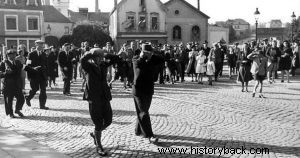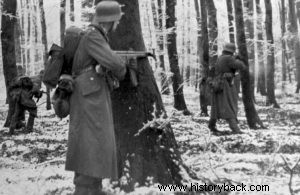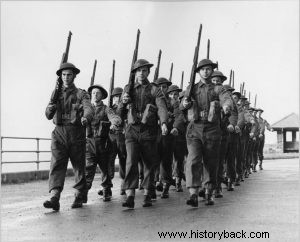
Fianden is a small town on the border between Luxembourg and Germany. Today it has about 2,000 inhabitants, while the old castle built on a hill 310 m high dominates the city. The small duchy suffered the German invasion on May 10, 1940.
Having minimal forces, he succumbed to the invaders. However, there were bright examples of resistance, such as the refusal of the Luxembourgers to vote for their union with Germany, the general strike of 1942. The Germans, illegally, incorporated the country into the "greater Reich" and recruited 12,000 Luxembourgers of whom 3,000 were killed. The Germans imposed the use of the German language and in reaction the Luxembourgers began to speak exclusively their local German dialect.
Resistance groups began to be created from the winter of 1940-41. In September 1944 the Germans retreated under American pressure and Luxembourg was liberated. A national guard was immediately formed which, equipped with American armament, undertook the guarding of the country.
The Luxembourgers at Fianden were deployed along the German border and acted as an Allied outpost, due to the high ground they occupied having a full view of German movements. On November 15, 1944, the Luxembourg national guards in the area of Fianden spotted a German patrol which they attacked.
Of the 11 Germans, five were killed without the Luxembourgers suffering losses. After that, the German administration decided to occupy the castle of Fianden in order to prohibit the observation of the German positions.
The head of the local national guard Victor Abens had only 30 men . Nevertheless, after first ordering the population of the city to leave, he decided to stay in the city and fight. The Americans supplied the Luxembourgers with ammunition, but did not reinforce them with men.
On November 19, 1944 two Waffen SS companies with a total strength of 250 men attacked the town and castle , after a short bombardment. Four Luxembourgers had fortified themselves in the castle. The others had fortified themselves in the houses of the city.
The Germans attacked the castle, but it was difficult to approach. After a fierce exchange of fire, six SS men managed to blow up the gate of the castle and enter it. The Luxembourgers, however, continued to fight inside the castle, eventually forcing their opponents to withdraw.
Then the German forces attacked the city. There, however, they encountered even tougher resistance and were forced to withdraw in humiliation, crossing into German territory. In the battle 18 SS men were killed, against a single Luxembourg national guard. Six other Luxembourgers were injured, three seriously. A civilian who had refused to leave was also killed.
About a month later the Germans launched the Ardennes Offensive. Of course the Luxembourgers were unable to resist Fianden and retreated to join the American forces.

Luxembourgish national guards have arrested compatriots the collaborators of the Germans.

German divisions in Luxembourg in 1944.

Luxembourg soldiers in Britain.
